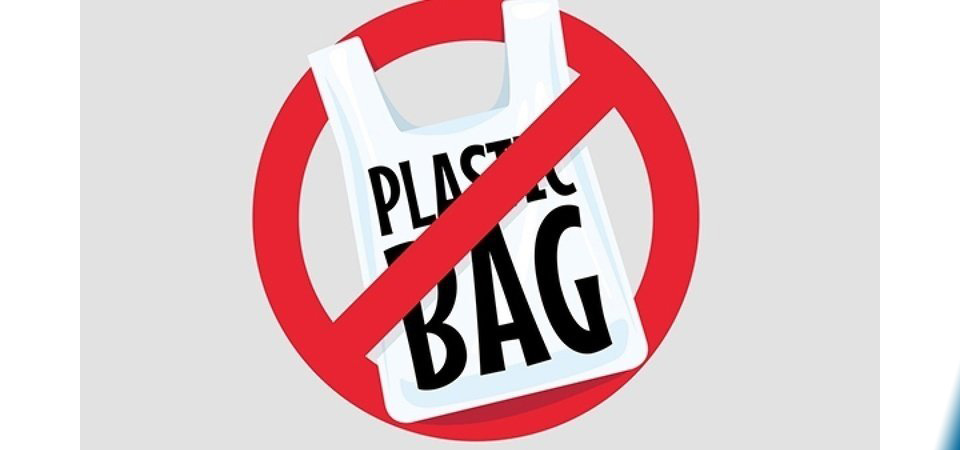Consumer habits need to change to displace plastic bags: Retailers

By Aashish Mishra
Kathmandu, July 7: While presenting the budget for the fiscal year 2021/22 on May 29, Minister for Finance Bishnu Paudel announced that the government would ban the import, manufacture, sale and distribution of all plastic measuring below 40 microns in width from July 16. He also said that stores and malls would be required to provide biodegradable cotton, jute or paper bags to their customers instead of plastic ones. This move was hailed by environmental groups as a big step against plastic pollution. But store-owners have a rather mixed reaction.
Hemant Khakurel, who runs a grocery shop in Kalo Pul, Kathmandu, felt that the government should have also introduced consumer awareness programmes when announcing the ban. “Shops give plastic bags only because the customers demand it. They do not bring bags from home and are unwilling to pay a few rupees extra for cloth or paper bags. If we do not give them (plastic bags) then they will stop coming to our shops,” he said.
Chetan Kandel, owner of an electric store in Thasikhel, Lalitpur, also believed that the government’s decision had failed to take consumer habits into account. “People want plastic bags because they can be used for everything from wrapping garbage to packing food. Paper bags tear easily and cloth bags are too precious to put rubbish in and throw out. That is why customers specifically ask for plastic bags even when offered alternatives,” he said.
Pavitra Bajracharya, immediate past president of Nepal Retailers Association (NRA), called the plastic ban unilateral and lamented that the government did not consult the stakeholders before announcing it. “We are the ones who deal with customers and we are the ones who know most about the ground reality. Yet, we were not made part of the discussion,” he complained.
Informing that stores spent thousands of rupees every year in purchasing plastic bags, Bajracharya stated that shops and malls would have the most to gain by displacing plastic. “But that cannot be done without consumer awareness,” the former head of the umbrella organisation of the country’s convenience stores stressed.
“Changing consumer preferences and habits takes time. The authorities need to formulate a comprehensive policy in collaboration with the retailers if they truly want to replace plastic with biodegradable options” he said, stating that the plastic ban would be very positive for the environment and the retailers wanted to help implement it effectively.
Supermarkets, though, have achieved some degree of success in orienting clients away from plastic. Bhat-Bhateni Supermarket and Departmental Store (BBSM), for instance, has not handed out a single plastic bag from any of its 18 stores in the country since 2016.
It was not easy, admitted Panu Poudel, chief operating officer of BBSM. “The first 10 days were hard and people did hassle us. But eventually, our customers realised that Bhat-Bhateni would not give plastic bags and began accepting alternatives or bringing bags from home.”
To wean consumers off plastic, Bhat-Bhateni ran a campaign for the first three months wherein it provided cotton bags free of cost. The supermarket chain also donated one rupee to the non-governmental organisation Hamri Bahini for every customer who chose a cloth bag over a plastic one. On occasions, it ditched the traditional jhola altogether and used cartons to put people’s items in. “By the end of the campaign, we had completely displaced plastic bags from our franchise,” Poudel shared.
BBSM has continued to maintain a partnership with Hamri Bahini which employs disadvantaged women to make environmentally-friendly bags for its stores. This provides a social incentive for people to choose cotton bags.
BBSM also makes sure to keep the price of cotton bags low. “People will not take a bag if it’s not affordable. So, we need to price them reasonably,” Poudel said.
The government had previously tried to ban plastic bags less than 20 X 35 inches in size and 40 microns in thickness inside Kathmandu Valley in April 2015. The ban came into effect on April 14, 2015 but could not be implemented because of the earthquake that struck the country the next day.
Recent News

Do not make expressions casting dout on election: EC
14 Apr, 2022
CM Bhatta says may New Year 2079 BS inspire positive thinking
14 Apr, 2022
Three new cases, 44 recoveries in 24 hours
14 Apr, 2022
689 climbers of 84 teams so far acquire permits for climbing various peaks this spring season
14 Apr, 2022
How the rising cost of living crisis is impacting Nepal
14 Apr, 2022
US military confirms an interstellar meteor collided with Earth
14 Apr, 2022
Valneva Covid vaccine approved for use in UK
14 Apr, 2022
Chair Prachanda highlights need of unity among Maoist, Communist forces
14 Apr, 2022
Ranbir Kapoor and Alia Bhatt: Bollywood toasts star couple on wedding
14 Apr, 2022
President Bhandari confers decorations (Photo Feature)
14 Apr, 2022









